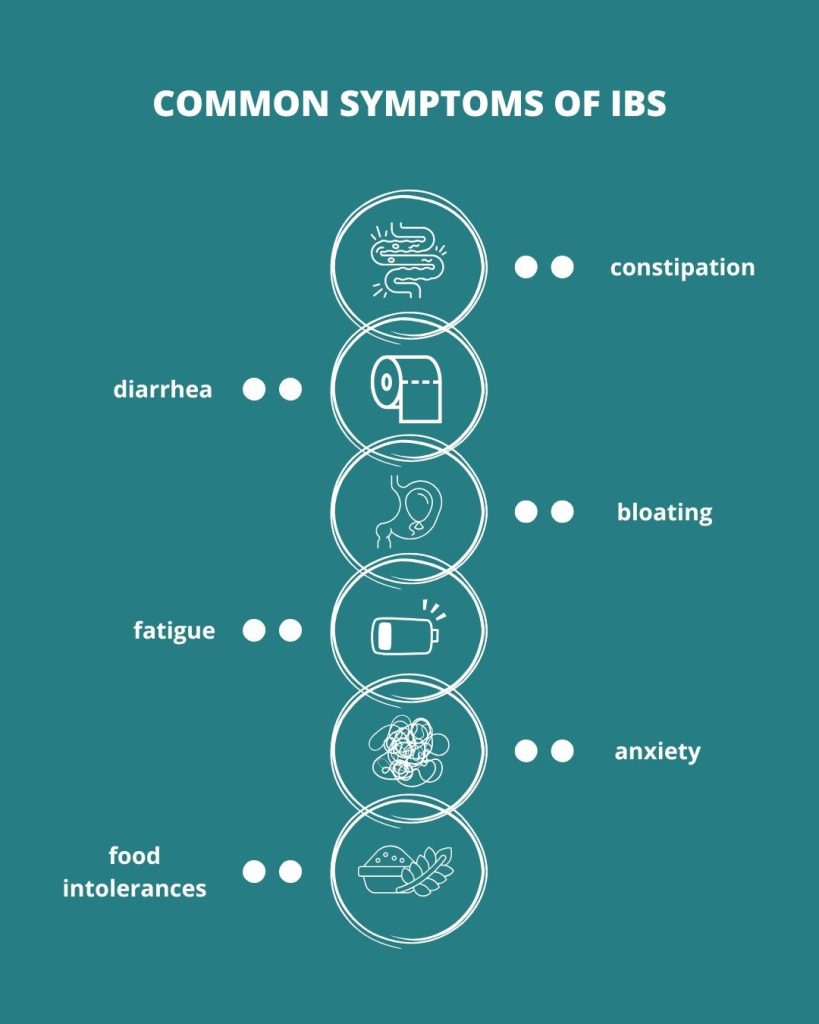Irritable bowel syndrome (IBS) is one of the most common digestive disorders, affecting millions of people worldwide. Symptoms of this disorder include stomach pain, bloating, diarrhea, constipation, and other indigestion problems. IBS can significantly affect quality of life, interfering with daily activities and causing discomfort.
According to estimates, between 5 and 101 percent of people suffer from IBS, while in developed countries this percentage increases to 10 to 15. IBS is more common in women than in men, and many women notice worsening of symptoms during menstruation. Symptoms may begin at a young age, in one’s 20s or 30s.
Symptoms of IBS – How to recognize irritable bowel syndrome?
Symptoms of IBS can vary from person to person, but most commonly include:
- Abdominal pain and cramps – usually subside after defecation or passing gas. The pain is most often found in the lower part of the stomach.
- Bloating – a feeling of bloating and flatulence in the stomach is a common occurrence in people with IBS.
- Diarrhea or constipation – people with IBS may have frequent, liquid stools (IBS-D) or infrequent, hard stools (IBS-C). Many people with IBS also have a combination of both conditions (IBS-M).
- Changes in the rhythm of bowel movements – stools can be weak and sometimes too frequent, so people with IBS often must go to the toilet without any previous warning.

What causes IBS? Reasons for the emergence of irritable bowel
The exact cause of IBS is still not fully understood. The reason for this is because it is a complex condition that can be caused by different factors, and they can intertwine with each other. IBS is therefore often referred to as a “multifactorial” disorder. There are several factors that can play a role:
- Disturbances in the intestinal microbiota – the intestines are home to billions of bacteria that help digest food. When this balance is disturbed, disorders such as IBS can occur.
- Increased intestinal sensitivity – people with IBS have more sensitive intestines to stimuli, and even normal digestive processes can cause pain and discomfort because the intestines overreact
- Genetics – although IBS is not hereditary, family history can increase the risk
- Stress and emotions – emotions, stress, anxiety and depression play a big role in the development of IBS. Scientists have discovered that there is a connection between the gut and the brain, and how we feel and what we think can significantly affect the function of our gut.1
As for stress, IBS can unfortunately be a “circular problem”, because stress makes symptoms worse, and IBS symptoms can cause additional stress.
Brain-gut connection – How does stress affect digestion?
You may be wondering what stress and digestion have in common. Much more than you think! Our gut and brain are closely connected and constantly communicating. This “brain-gut” system is also known as the “brain-gut axis” and explains how our emotional and mental processes can directly affect digestion.2 When we are stressed, our brain sends a signal to the intestines, which can cause cramps, pain, changes in stool and bloating. Similarly, digestive problems can affect our mood and cause anxiety and depression, creating a vicious cycle.
Tips for calming digestion in nervous situations:
- Avoid coffee on an empty stomach.
- Eat smaller and more frequent meals, rather than a big one late in the day.
- Massage the stomach in a clockwise direction.
- Listen to soothing music.
Why is it difficult to diagnose IBS?
One of the biggest challenges with IBS is diagnosis. There are no specific tests or examinations that can confirm IBS, so it is usually diagnosed by excluding other diseases. The symptoms of IBS can be very similar to those of some other digestive diseases, such as celiac disease or inflammatory bowel disease, so it is important to do the appropriate tests to rule out these more serious diseases.
Another challenge is that the symptoms of IBS can be very different from person to person. Some may have more frequent diarrhea, while others suffer from constipation, and some even from a combination of both. Because of these variations, it is difficult for many people to get a timely diagnosis, and it can be difficult for doctors to recognize IBS in its earlier stages.
Is IBS a lifelong condition?
IBS is a chronic condition, which means that it lasts a long time, but that does not necessarily mean that the symptoms will be present for a lifetime. In some cases, symptoms may come and go, and many learn to manage IBS with lifestyle changes, diet, and appropriate therapies.
Unfortunately, IBS is incurable, but that doesn’t mean people with IBS have to live in constant discomfort. With the right approach, symptoms can be kept under control and quality of life can be significantly improved.
How to manage IBS?
There are strategies that can help control symptoms:
- Diet – one of the most important factors in controlling IBS is diet. A low-FODMAP diet is recommended, which means avoiding certain types of carbohydrates that can cause bloating, stomach pain and diarrhea.
- Physical activity – it helps reduce stress and generally contributes to better digestion because it enables movement in the intestines.
- Stress management – relaxation techniques such as meditation, deep breathing and yoga can help reduce stress which can otherwise make symptoms worse
- Medicine and nutritional supplements – people with IBS are prescribed products that help reduce symptoms. These include nutritional supplements, foods for special medical purposes, antispasmodics for pain relief, laxatives for constipation and medicine to reduce diarrhea.
- Psychological therapies – Cognitive Behavioral Therapy (CBT) and other therapies can help manage the stress and emotional challenges of IBS, thus reducing the negative impact on the gut3
The role of butyrate in the treatment of IBS
Butyrates are short-chain fatty acids produced by good bacteria in the gut by fermenting fiber. They play a key role in maintaining the intestinal mucosa and serve as food for colon cells.
Studies have shown that butyrate can help with:
- Reducing pain and stomach cramps in people with IBS.4
- Improving the balance of the intestinal barrier, which can relieve flatulence and diarrhea.5
- Strengthening the mucous membrane in combination with probiotics and prebiotics, which contributes to better protection against irritation and infections.6
Butyrate can be obtained through dietary supplements or through foods rich in fiber that stimulate its natural production in the intestines, such as whole grains, vegetables and fermented products. In combination with dietary changes and stress management, butyrate can be an important part of an IBS management strategy.
Understanding IBS and improving quality of life
Irritable bowel syndrome can be challenging, but with proper diagnosis, treatment, and lifestyle changes, many can learn to live with it and manage all symptoms. Understanding the brain-gut connection, importance of physical activity, as well as managing stress and adjusting your diet, is key to controlling IBS.
References:
- Mayer, E.A., Ryu, H.J. & Bhatt, R.R. The neurobiology of irritable bowel syndrome. Mol Psychiatry 28, 1451–1465 (2023). https://doi.org/10.1038/s41380-023-01972-w
- DSM-Firmenich. (2025, 2. srpnja). New science: Synbiotic-butyrate capsule supplement opens new doors for IBS symptom management. Preuzeto 23. rujna 2025. s https://www.dsm-firmenich.com/en/businesses/health-nutrition-care/news/press-releases/2025-07-02-new-science-synbiotic-butyrate-capsule-supplement-opens-new-doors-for-ibs-symptom-management.html
- Lacy, Brian E. PhD, MD, FACG1; Pimentel, Mark MD, FACG2; Brenner, Darren M. MD, FACG3; Chey, William D. MD, FACG4; Keefer, Laurie A. PhD5; Long, Millie D. MDMPH, FACG (GRADE Methodologist)6; Moshiree, Baha MD, MSc, FACG7. ACG Clinical Guideline: Management of Irritable Bowel Syndrome. The American Journal of Gastroenterology 116(1):p 17-44, January 2021. | DOI: 10.14309/ajg.0000000000001036
- Lewandowski, K., Kaniewska, M., Karłowicz, K., Rosołowski, M., & Rydzewska, G. (2022). The effectiveness of microencapsulated sodium butyrate at reducing symptoms in patients with irritable bowel syndrome. Przeglad gastroenterologiczny, 17(1), 28–34. https://doi.org/10.5114/pg.2021.112681
- Scarpellini, E., Lauritano, E. C., Lupascu, A., Petruzzellis, C., Novi, M. L., Roccarina, D., Gabrielli, M., Serricchio, M., Gasbarrini, G., & Gasbarrini, A. (2007). Efficacy of butyrate in the treatment of diarrhoea-predominant irritable bowel syndrome. Digestive and Liver Disease Supplements, 1(1), 19–22. https://doi.org/10.1016/S1594-5804(08)60006-6
- DSM-Firmenich. (2025, 2. srpnja). New science: Synbiotic-butyrate capsule supplement opens new doors for IBS symptom management. Preuzeto 23. rujna 2025. s https://www.dsm-firmenich.com/en/businesses/health-nutrition-care/news/press-releases/2025-07-02-new-science-synbiotic-butyrate-capsule-supplement-opens-new-doors-for-ibs-symptom-management.html

